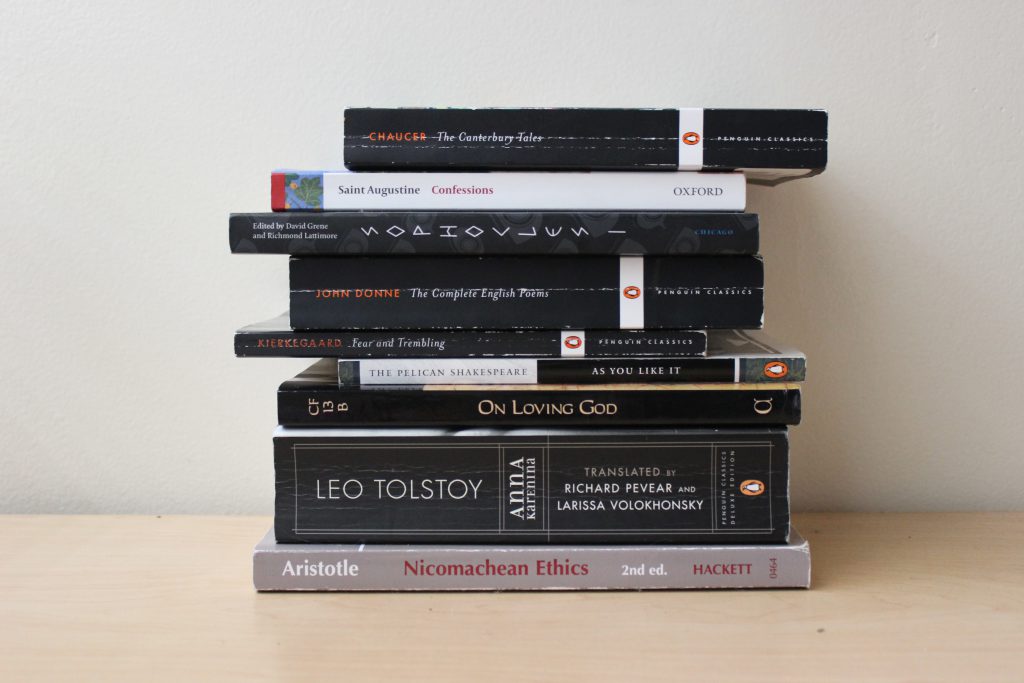The Scriptorium Daily
A few weeks ago Biola had the delight of installing our new Provost and Senior Vice President, Dr. Deborah Taylor. Part of the installation involved a series of charges from faculty who had been invited to articulate some of the key challenges ahead of Dr. Taylor in her new role, from Biblical and missional fidelity to commitments to diversity and global impact.
I was tasked with delivering the charge to maintain the commitment to the liberal arts. It was a humbling task to try to speak for and to so many, let alone to in 4 minutes or less distinguish what makes the study of the liberal arts worth striving for at a Christian university. But one of the great things about Torrey is that we are constantly planting the seeds and then tasting the fruit of what the liberal arts has to offer as a handmaiden to theology and worship. That, and I had just finished reading Dante’s Paradise and talking for hours with students about what kind of happiness were we made for exactly. That and I just observed Dr. Todd Thompson lead a class on Augustine’s On Christian Teaching. That, plus the thoughts of John Henry Newman, the Westminster Catechism, Josef Pieper, John Calvin, Thomas Traherne, Thomas Aquinas, John Calvin, Jonathan Edwards, Edmund Burke, Augustine’s City of God, the Gospels, Job, Genesis, Paul’s epistles, and many others from the books we read. So given all that, here’s what I came up with after many years of listening and taking part in the great conversation:
———
“Dr. Taylor,
“We are a place that trains nurses and scholars, equips teachers and engineers, prepares members of symphony orchestras and film crews. We display a dazzling diversity of what it can mean to serve the common good in the name of Jesus Christ. And God is calling our students to be missionaries, to write novels, to start businesses, to raise families, to lead churches, to run cities; He is calling our faculty to write books and articles and symphonies, serve on hospital boards, run master classes, make art. But none of us were made for work. Our truest vocation lies not in the limited and changeable work that we do, but in the call to behold our God. God is calling us not to work for Him forever, but to enjoy Him forever.
“For this vocation, we all, students and faculty alike, need the liberal arts in this learning community. We need the space, the unhurried time, the freedom to cultivate our capacities to understand the truth for the sake of delight, unfettered by any other uses we might put the truth to. For our ability to see and to enjoy persist beyond any immediate practical use we can come up with!
“The exact disciplines listed under the liberal arts have changed over time; for starters, I suppose, we could look back to the 7 liberal arts rooted in the ancient tradition: grammar, logic, rhetoric, arithmetic, geometry, music, and astronomy. All exercise the mind in order to nurture the two kinds of enjoyment proper to human beings: the joys of language and the joys of thought. For intrinsically enjoyable are the apt phrase, the elegant sentence, a well-refined argument, a complex pattern discerned and communicated, whether through poetry, music, or a differential equation. These things are in themselves delightful, and the liberal arts grow our ability to see them for what they are, and to simply enjoy them.
“Moreover, pursuing together the joys of language and the joys of thought nurtures our communion with each other and with God; we learn to speak and to hear more truly and fully; we learn to perceive, to understand, and to judge more wisely…about anything! The liberal arts encourages us to consider wisdom not as fragmented facts or disconnected specializations, but as a unified whole, a pattern of relations and significance whose unity comes from being the work of a perfect Creator.
“Dr. Taylor, keep urging us all to return again and again to what is elementary, what is foundational. To consider as carefully as we can first principles, to refine our capacities for the most abstract thinking and clearest expressions of thought, and to search out the ground we humans hold in common with each other, the dead, and the yet unborn, and glory of glories, even with Christ himself, who showed us what being human really means.
“But let us not in that continual return to elementary things, begin to neglect or fragment into disconnected pieces what God has made unified and full of significance. Keep reminding us that all created things, seen rightly and fully for what they are, can lead us back to their Creator. In their goodness, and order, and beauty, we are led to contemplate Him who is perfectly good, all-wise, and sublimely beautiful. Do not let us grow weary of discerning meaning in all the world and in seeking the unity of truth, for, as Augustine says “Wisdom is not many things but one thing in which there are immense and infinite treasuries of intelligible things”.
“And finally, Dr. Taylor, keep preserving for us the kind of freedom we need for speaking clearly and thinking deeply, those activities through which we pursue our truest vocation—the one thing that human beings do entirely for its own sake!—to behold and thereby to love the Lord our God with all our heart, soul, and mind.”
